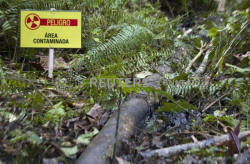Canadian court dismisses Ecuador's $9.5 billion claim
against Chevron Canada
 Send a link to a friend
Send a link to a friend
 [April 05, 2019]
By Nia Williams [April 05, 2019]
By Nia Williams
CALGARY, Alberta (Reuters) - The Supreme
Court of Canada on Thursday dismissed claims attempting to force Chevron
Corp's Canadian unit to pay a $9.5 billion judgment handed down in
Ecuador against the U.S. oil major over pollution in the Andean country.
Residents of Ecuador's Lago Agrio region have been trying to force
Chevron to pay for water and soil contamination caused from 1964 to 1992
by Texaco, which Chevron acquired in 2001.
The villagers obtained a judgment against Chevron in Ecuador in 2011.
But the company has no assets in the country, and the villagers have
been trying to sue it in the United States, Canada, Brazil and Argentina
to enforce the decision.

The Court of Appeal for Ontario ruled in 2017 that Chevron Canada was a
separate entity to its parent company and its shares and assets could
not be seized by those seeking to enforce the Ecuadorian judgment.
Canada's highest court rejected a request to review that decision, which
is now final.
"Any further efforts by the plaintiffs' lawyers to continue this lawsuit
in Canada would be an abuse of the country's legal system and a waste of
its judicial resources," said R. Hewitt Pate, Chevron's vice president
and general counsel.
[to top of second column] |

A pollution warning sign is seen near a contaminated oil pool, said
to be caused by Chevron-Texaco, in Aguarico, some 480km (298 miles)
east of Quito, September 17, 2013. REUTERS/Guillermo Granja

An international tribunal unanimously ruled last year that the pollution
judgment by Ecuador's Supreme Court against Chevron was procured through fraud,
bribery and corruption.
Texaco was released from liability through a settlement with Ecuador years
earlier, the tribunal found.
Patricio Salazar, one of the lawyers for the affected communities, said the
Supreme Court ruling left parent company Chevron Corp as the sole defendant and
the communities would proceed immediately to trial to force the U.S. oil company
to comply with the Ecuadorian judgment.
"While we wanted the Canada Supreme Court to hear the issue, its denial of our
motion does not mean the issue is resolved and it can still be decided at a
later date after we enforce the judgment," said Salazar.
(Reporting by Nia Williams; Editing by David Gregorio and Peter Cooney)
[© 2019 Thomson Reuters. All rights
reserved.] Copyright 2019 Reuters. All rights reserved. This material may not be published,
broadcast, rewritten or redistributed.
Thompson Reuters is solely responsible for this content.
 |